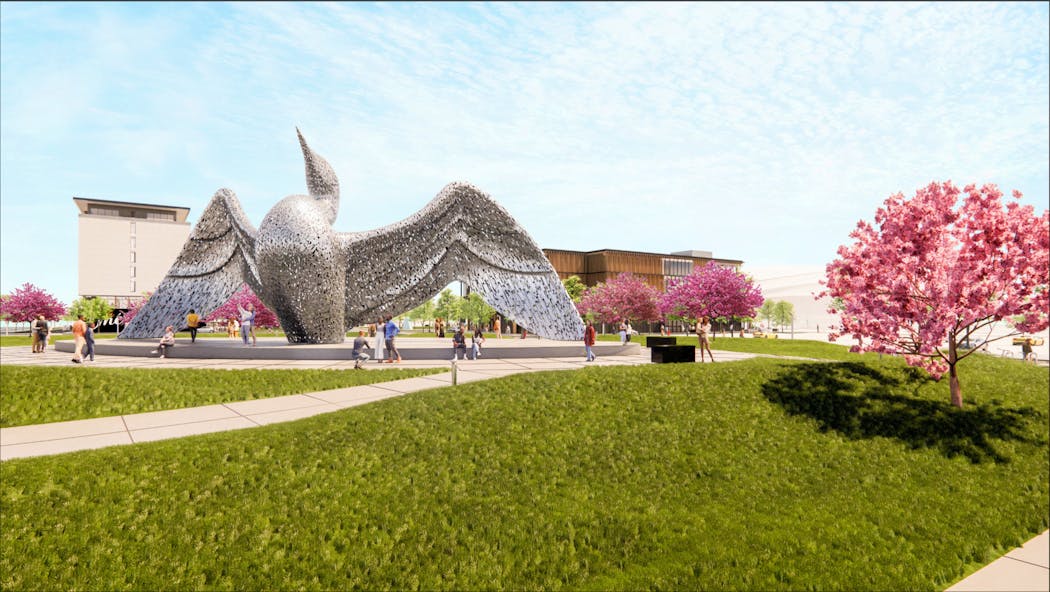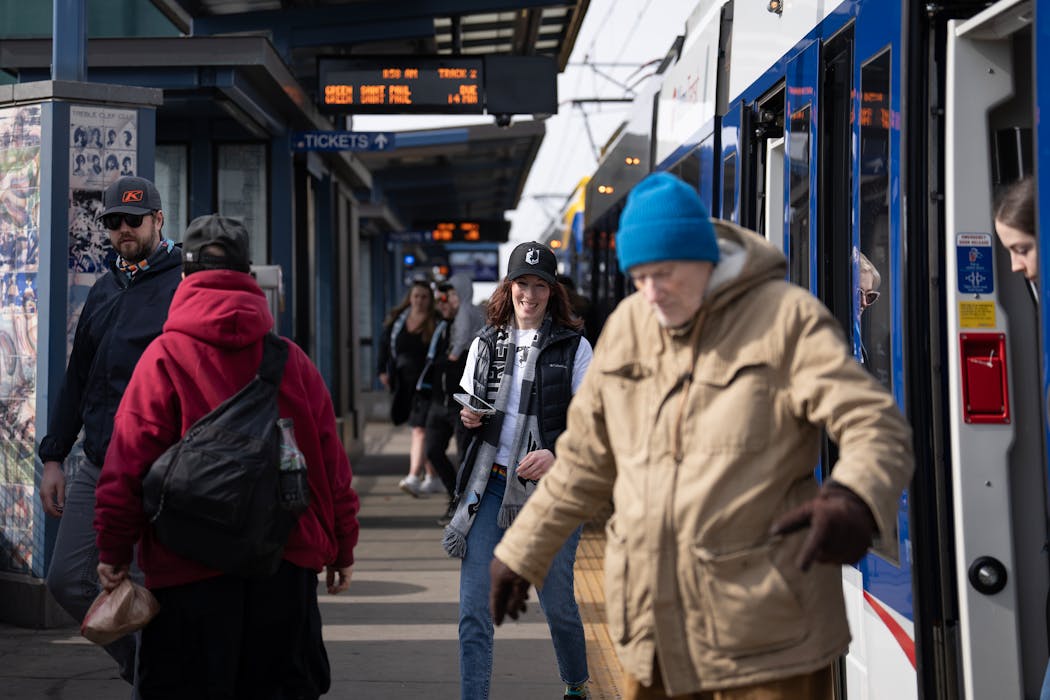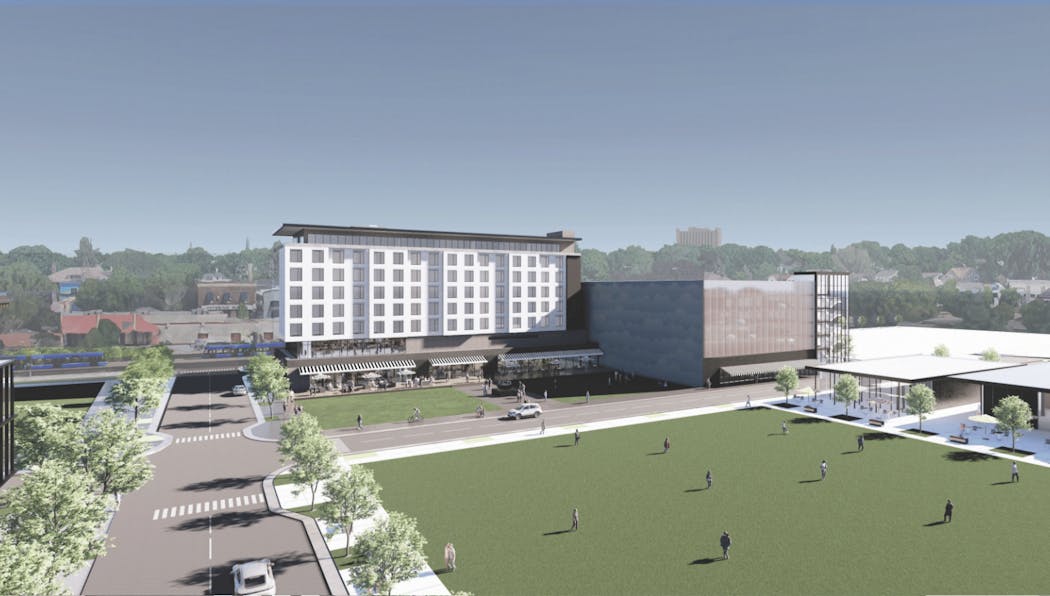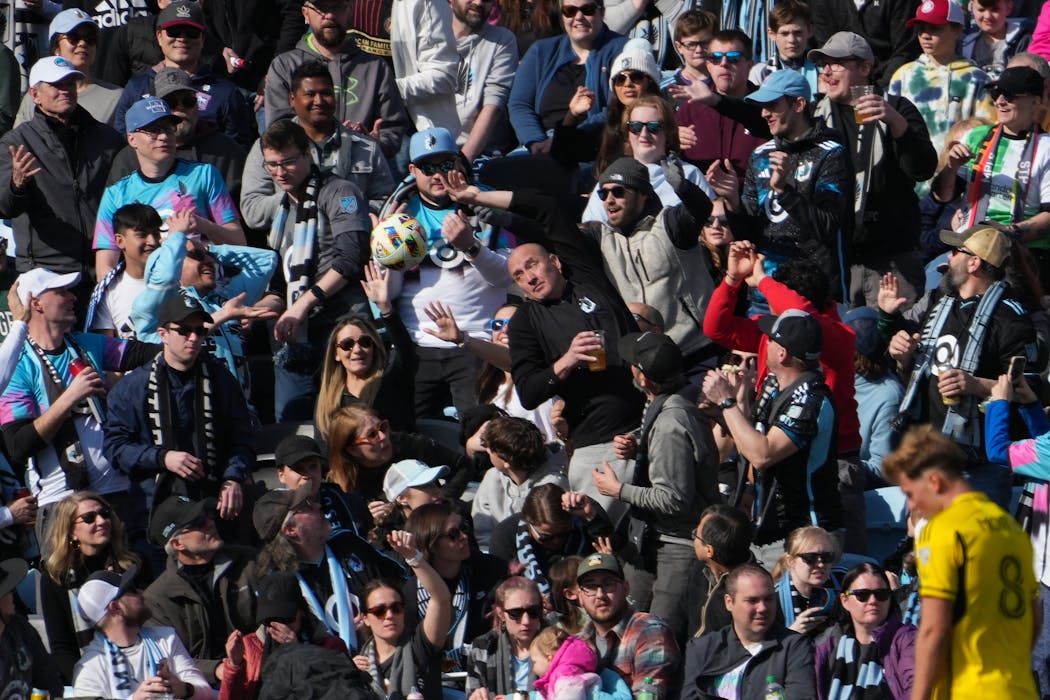Soccer fans returning to St. Paul's Midway neighborhood for the Loons home opener last weekend found the view little changed from the year before. Allianz Field remains perched in a barren landscape of surface parking lots.
Excitement about what could emerge here has been brewing since 2016, when the master plan for a mixed-use development surrounding the stadium was approved. But those plans have been pushed out and scaled back.
In the coming months, United Village developers say they will build a sculpture garden, featuring a 33-foot statue of a loon, and an all-abilities playground as the first part of that vision.
That can't come soon enough for many locals and business owners. They have held onto hope that redevelopment around the stadium would lift the fortunes of a neighborhood that welcomed the stadium but was then scarred by riots and arson following the Minneapolis police murder of George Floyd in 2020.
Wes Burdine, owner of a nearby bar called Black Hart of Saint Paul, said owners of vacant properties in the surrounding neighborhood are reluctant to move forward on redevelopment until they see construction start around Allianz Field.
"I think that's the biggest [frustration] around the slow pace of that development, it's how the other dominos haven't yet begun to go," Burdine said. "So that means development of all these other empty storefronts and lots around the neighborhood are still many years away."
Dr. Bill McGuire, managing partner of Minnesota United and the lead developer for the "super block" surrounding Allianz Field, is counseling patience.
"We're trying to do this and fulfill these things. But sometimes it takes time," McGuire said. "It will be a great place that people want to go to."
Where the plans stand
McGuire acknowledged that the current plans are far more modest than the original vision, 1 million square feet of office space, a movie theater and a soccer-centered residential urban village.
He blamed the global pandemic and the unrest of 2020. "What you're seeing now are efforts that have been going on since the beginning, but the world has changed," McGuire said.
McGuire said the first public amenities — the sculpture garden and playground — are designed to attract people to the area. If the city signs off on development agreements, he said a hotel and office building could be next to rise.
In January, a Union Park District Council committee reviewed plans for the hotel and parking ramp proposed for the current site of McDonald's on University Avenue.
In December, the St. Paul Housing and Redevelopment Authority approved up to $17 million in tax-increment financing for the first phase of the United Village redevelopment.
Development dominos yet to fall
On Saturday, some Loons fans lamented the lack of activities around the stadium for before and after games.
"We're early people. We would definitely be here if there was more to do," said Kari Gehrke of Burnsville, on her way to the game.
At Black Hart, one of the few bars in walking distance of Allianz Field, regulars include soccer fans, members of the LGBTQ community and neighbors. Burdine said he's heard, and shared, frustrations over the slow pace of development at United Village and its ramifications for the neighborhood.
"While I absolutely wish that it was moving faster, we also had the pandemic, and now interest rates are double what they were," Burdine said. "I have a little bit more patience."
He said developers seem to have what he says is a false impression that the neighborhood is crime-filled and economically depressed. It's not, Burdine said. Since the former Town House Bar became Black Hart in 2018, revenue has doubled. "I'm maybe one of the biggest testaments showing that all you have to do is do a little bit," he said.
Still, any vista of the neighborhood includes empty buildings, including the shell of a CVS at the corner of University and Snelling, and the former T.J. Maxx and Herberger's stores down the street, among others.
"I look at [United Village], and at least there's a plan to develop that," he said. "I look at the rest of the neighborhood, and I see all these other property owners and people just sitting on land and letting it get full of trash."
Down the street, Kathy Stransky has owned the Midway Used and Rare Books, on the corner of University and Snelling avenues, with her husband, Tom, since 1980.
The store is steps away from the Snelling Avenue light-rail station, a magnet for loiterers and people with addiction. Panhandlers often stand dangerously close to cars at the busy nearby intersection.
Years ago, the bookstore was open from 10 a.m. until 10 p.m. As book-browsing habits changed, closing time moved earlier — for a long time, 7 p.m. In recent years, that moved up to 5 p.m. After a store volunteer was assaulted by a shoplifter, Stransky recently decided to lock the doors even when the store is open. She thinks the city and developers of United Village need to step up.
"We actually do need help if we're going to keep staying here," she said. "We're not feeling safe here anymore."
Hope on the horizon?
Help may be on the way. Last session, the Minnesota Legislature approved grants of up to $50,000 and loans of up to $1 million for businesses, nonprofits and developers in areas affected by racial discrimination, unrest, lack of access to capital and other factors.
Justin Lewandowski, the organizing director for the Hamline-Midway Coalition said most of the Midway neighborhood is eligible for the program. Lewandowski said that in canvassing local businesses to spread the word, some owners were "floored" at the prospect of getting this kind of help.
Both the Hamline-Midway and Union Park coalitions are in the process of moving to Spruce Tree Center, the green tile-clad building across the street from the future United Village, Lewandowski said. The Hamline-Midway Coalition has applied to adopt the light-rail platform just outside its new office building, to help keep it clean and more monitored.
Lewandowski said the councils are also renewing efforts to relay information between residents, businesses and United Village representatives. They are hosting a community meeting with updates on the development at the stadium on March 14.
Anika Bowie, a newly elected councilmember whose ward includes the United Village area, said she thinks McGuire's plans are a good start. But she said she has shared with McGuire that any new development needs to happen in cooperation with existing businesses, many of which are owned by African and Asian immigrants.
Bowie called on McGuire to think about offering space in new development to local restaurants or finding other partnership opportunities for businesses on University Avenue. "This is our economic corridor."

Want to share info with the Star Tribune? How to do it securely

'Safe recovery sites' would offer syringes, naloxone and more to people using drugs. The plan could be in peril.
New Minnesota GOP leaders seek peace with party's anti-establishment wing

Who is Republican Lisa Demuth, Minnesota's first House speaker of color?





